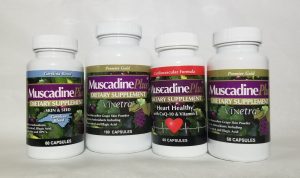
Not only are muscadine grapes sweet and easy to digest thanks to their high fiber content, but they also are associated with several key health benefits—and there may even be a correlation between muscadine consumption and longevity. There are many health benefits of muscadine grapes, but here are the top five associated with regularly consuming this nutritious fruit:
1. Improved Skin Health: Muscadine grapes are rich in antioxidants, including polyphenols and resveratrol, which help protect the skin from damage caused by free radicals. These antioxidants can help improve the overall appearance of the skin and reduce the signs of aging. Additionally, muscadine grapes are high in vitamin C, which is essential for collagen production and maintaining skin elasticity.
2. Brain Health: The polyphenols in muscadine grapes have been linked with having a positive effect on brain health. They may be associated with improving cognitive function, memory, and reducing the risk of neurodegenerative diseases such as Alzheimer’s and Parkinson’s.
3. Heart Health: Muscadine grapes are a great source of heart-healthy compounds, including anthocyanins and resveratrol. These compounds help improve cardiovascular health by reducing inflammation and oxidative stress in the body, which can contribute to heart disease. Additionally, muscadine grapes are low in sodium and high in potassium, which may help to lower blood pressure and reduce the risk of stroke.
4. Antioxidants: Muscadine grapes are rich in antioxidants, including polyphenols and resveratrol. These compounds help protect the body against oxidative stress, which is caused by the accumulation of harmful molecules known as free radicals. Oxidative stress can lead to cell damage and increase the risk of chronic diseases such as cancer, heart disease, and neurodegenerative disorders. Antioxidants work by neutralizing free radicals and reducing oxidative stress, which are linked to improving overall health and may prevent chronic diseases. Additionally, antioxidants support the immune system, reduce inflammation,
 and likely slow down the aging process. Some of the most commonly found antioxidants include vitamins C and E, beta-carotene, and selenium. These can be found in a variety of foods, including fruits, vegetables, nuts, and whole grains. Incorporating a diet rich in antioxidants can help maintain good health and prevent chronic diseases.
and likely slow down the aging process. Some of the most commonly found antioxidants include vitamins C and E, beta-carotene, and selenium. These can be found in a variety of foods, including fruits, vegetables, nuts, and whole grains. Incorporating a diet rich in antioxidants can help maintain good health and prevent chronic diseases.
5. Potential Protection from Cancer: The high levels of antioxidants in muscadine grapes may help protect against cancer. Studies have shown that the polyphenols in muscadine grapes may help prevent the growth and spread of cancer cells, and resveratrol has been shown to potentially have anti-tumor effects.



 and likely slow down the aging process. Some of the most commonly found antioxidants include vitamins C and E, beta-carotene, and selenium. These can be found in a variety of foods, including fruits, vegetables, nuts, and whole grains. Incorporating a diet rich in antioxidants can help maintain good health and prevent chronic diseases.
and likely slow down the aging process. Some of the most commonly found antioxidants include vitamins C and E, beta-carotene, and selenium. These can be found in a variety of foods, including fruits, vegetables, nuts, and whole grains. Incorporating a diet rich in antioxidants can help maintain good health and prevent chronic diseases.